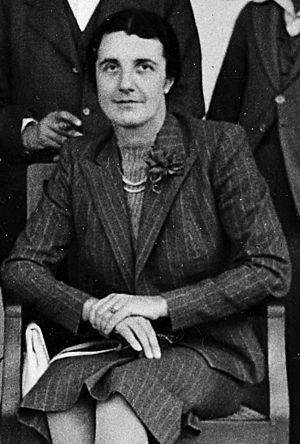Janet Vaughan facts for kids
Quick facts for kids
Janet Vaughan
|
|
|---|---|

Vaughan in 1944
|
|
| 6th Principal of Somerville College, Oxford | |
| In office 1945–1967 |
|
| Preceded by | Helen Darbishire |
| Succeeded by | Barbara Craig |
| Personal details | |
| Born |
Janet Maria Vaughan
18 October 1899 Clifton, Bristol, England |
| Died | 9 January 1993 (aged 93) UK |
| Education | North Foreland Lodge |
| Alma mater | Somerville College, Oxford |
| Profession | Physician, physiologist, college head |
| Awards | DBE (1957) FRS (1979) |
Dame Janet Maria Vaughan (born October 18, 1899 – died January 9, 1993) was a famous British scientist. She studied how the human body works, especially blood. She also researched how radiation affects the body. From 1945 to 1967, she was the head of Somerville College at Oxford University.
Contents
Early Life and Education
Janet Vaughan was born in Clifton, Bristol, England. She was the oldest of four children. Her father, William Wyamar Vaughan, was a headmaster. She was also a cousin of the famous writer Virginia Woolf.
Janet was taught at home for a while. Later, she went to North Foreland Lodge school. She then studied medicine at Somerville College, Oxford. There, she learned from important scientists like Charles Scott Sherrington and J.B.S. Haldane. She finished her medical training at University College Hospital in London. During this time, she saw how poverty affected people's health in the city's poor areas. She also received a special scholarship to study at Harvard University in the United States.
A Doctor and a Race Car Driver!
It was hard for women doctors to get patients back then. So, Janet Vaughan sometimes had to do experiments on pigeons. A writer once described her as a "competent" woman who worked hard to solve big scientific problems.
In 1932, Janet Vaughan showed her adventurous side. She and her friend, Dr. Frances Charlotte Naish, won the Ladies' Cup at the famous Monte Carlo Rally. This was a car race where they drove from different starting points to Monte Carlo. They even stopped during the race to help people who had been in a car accident!
Important Medical Work
Janet Vaughan made a huge difference in medicine. In 1938, she helped create the first national blood banks in London. This was very important for saving lives, especially during wartime. She worked with Federico Duran-Jorda to set up a system for collecting and storing blood. The special bottle used for blood collection was even named the "Janet Vaughan" bottle.
After World War II, in 1945, she went to Belgium and Germany. She researched how to help people who were starving. She worked at the Bergen-Belsen concentration camp. Her work greatly improved how people suffering from extreme hunger were fed.
Janet Vaughan studied many important things. She researched blood diseases and how to give blood transfusions. She also studied how starvation affects the body. Later, she became well-known for her work on how plutonium (a radioactive element) affects bones and bone marrow. In 1934, she wrote a book called The Anaemias. It was one of the first books to focus only on blood diseases.
Leading Somerville College
From 1945 until she retired in 1967, Janet Vaughan was the Principal of Somerville College. This meant she was the head of the college. While she was Principal, two future important British women studied there: Shirley Williams (who became a Baroness) and Margaret Thatcher (who later became the Prime Minister of Britain).
Besides her college work, she also served on important committees. She helped with a group that looked into equal pay for men and women. She was also a founder of the Nuffield Foundation, which supports research and education.
Awards and Recognition
Janet Vaughan received many honors for her amazing work.
- In 1957, she was made a Dame Commander of the Order of the British Empire (DBE). This is a very high honor in Britain.
- In 1967, Oxford University gave her an honorary degree.
- In 1979, she was chosen to be a Fellow of the Royal Society (FRS). This is a special group for top scientists.
Family Life
Janet Vaughan married David Gourlay in 1930. They had two daughters named Mary and Frances.
 | Mary Eliza Mahoney |
 | Susie King Taylor |
 | Ida Gray |
 | Eliza Ann Grier |

